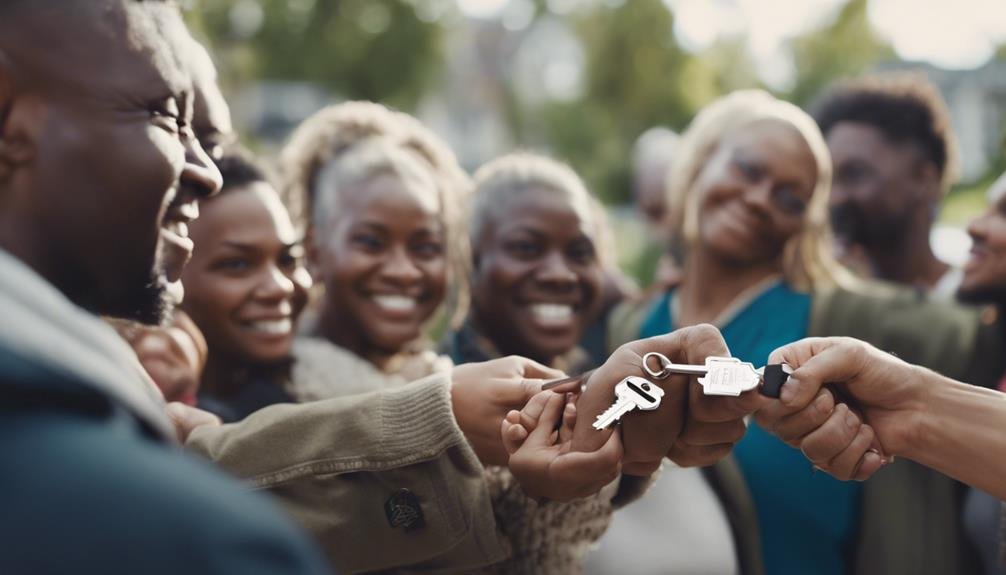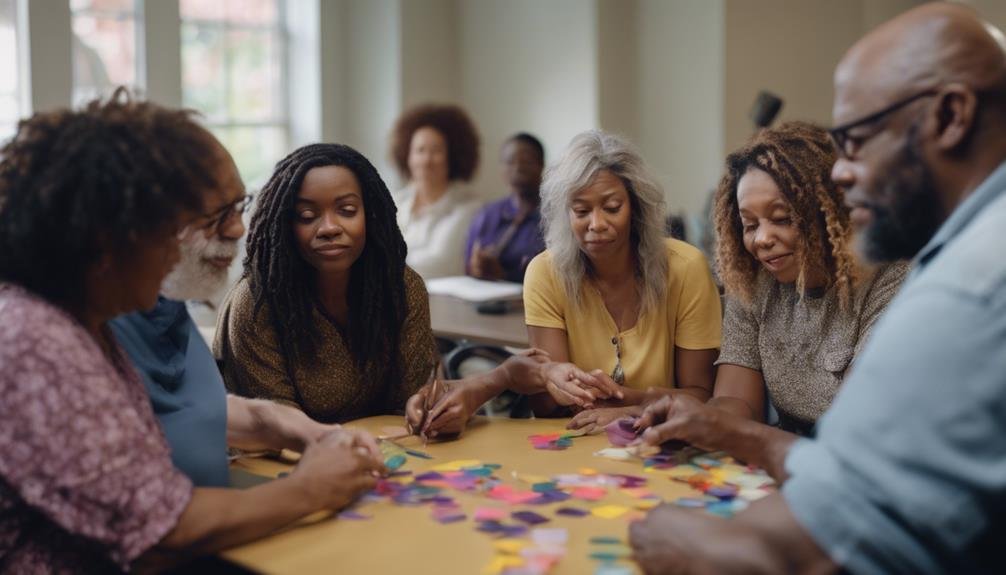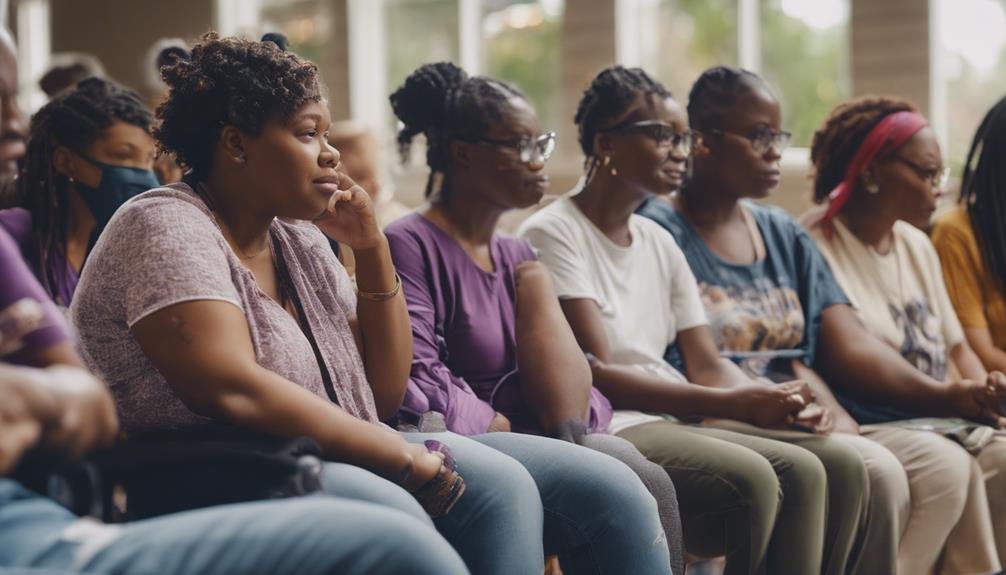Community-based programs curb domestic violence by providing survivors a nurturing environment, raising awareness, and empowering individuals with necessary support to break the cycle of abuse. These programs prioritize survivors’ needs, offer essential services, and create safe spaces for healing. Through culturally competent services and advocacy, survivors gain tailored support and trust to seek help. Safe housing options offer solace and protection, aiding survivors to escape violence. By promoting respect and mutual responsibility, these programs encourage a culture of understanding and empowerment. The result is ahttps://howtoapplyforgrants.com/sample-ngo-or-nonprofit-grant-proposals/effectiveness-of-community-based-programs-in-preventing-domestic-violence-sample-proposal/ community-driven approach that fosters healing, prevention, and long-lasting support.
Key Takeaways
- Foster a supportive environment for survivors.
- Promote awareness and prevention efforts.
- Empower survivors to seek help and support.
- Build a network of resources and support systems.
- Enhance awareness and education through collaborative initiatives.
Impact of Community Engagement
Engaging with your community in efforts to prevent domestic violence can have a significant impact on fostering a supportive environment for survivors and promoting awareness. By actively participating in prevention efforts, you not only contribute to creating a safer community but also empower survivors of domestic violence to seek help and support.
Social workers need strong community engagement to build a network of resources and support systems for survivors. Collaborative initiatives through community-based programs play an important role in enhancing awareness, education, and tailored interventions for those affected by domestic violence.
When communities come together to combat family violence, they create a space for open dialogue and support, breaking the cycle of isolation that often accompanies domestic abuse. These prevention efforts not only empower survivors but also turn community members into active change agents against domestic violence.
Survivor-Centered Support Systems
To better support domestic violence survivors within community-based programs, ensuring their needs and safety are prioritized is essential. Survivor-centered support systems play a vital role in preventing further harm and promoting empowerment. These programs are tailored to provide survivors with essential services like counseling, legal assistance, and shelter, aiming to empower them to regain control of their lives.
By focusing on building trust and creating a safe space for disclosure and healing, community-based programs foster an environment where survivors feel supported and understood. Additionally, involving survivors in decision-making processes ensures their voices are heard and their choices respected, further enhancing their sense of agency and empowerment.
The survivor-centered approach in these programs is designed to break the cycle of violence, promote long-term healing, and empower survivors to rebuild their lives with confidence and security.
Culturally Competent Services
Culturally competent services in community-based programs play an essential role in addressing the unique needs of diverse survivors of domestic violence. These services are pivotal in providing tailored support that respects and integrates cultural traditions, beliefs, and practices.
By offering culturally competent interventions, trust and engagement among survivors from various cultural backgrounds are increased, leading to more effective violence prevention outcomes.
Acknowledging cultural differences is key for community resources and service providers to empower survivors to seek help and access the support they need. Culturally competent services not only promote a sense of safety but also foster understanding and inclusivity for survivors.
This inclusive approach is essential for creating an environment where survivors feel heard and supported, ultimately contributing to more successful outcomes in curbing domestic violence. By valuing cultural competence, community-based programs can make a significant impact in the lives of survivors.
Network of Advocacy and Counseling
You aren’t alone in this journey. Advocacy and counseling services are here to provide you with the support and resources you need to navigate through this challenging time.
Trained advocates will work closely with you to create personalized safety plans and address your unique needs, empowering you to make decisions that prioritize your well-being.
Counseling for Victims
Within community-based programs, the network of advocacy and counseling serves as an essential lifeline for victims of domestic violence, offering critical emotional support and guidance. Counseling for survivors in these programs plays a crucial role in providing a safe space for individuals to express their feelings, process trauma, and regain a sense of empowerment.
Trained advocates offer personalized support, safety planning, and referrals to specialized services to help survivors navigate the complexities of legal and social systems. Through counseling and advocacy, survivors not only receive emotional support but also gain valuable insights into their rights, make informed decisions, and build resilience in the aftermath of domestic violence.
These services enhance survivors’ access to resources and assistance, fostering a supportive environment that aids in their healing process and journey towards recovery. The combination of counseling and advocacy within community-based programs significantly contributes to empowering survivors and promoting their overall well-being.
Advocacy Services Provided
Advocacy services within community-based programs play an essential role as a support network for survivors of domestic violence, offering a range of specialized assistance and guidance to aid in their journey towards healing and empowerment. These services provide survivors with safety planning, access to services, and a network of trained advocates and counselors dedicated to their well-being. Advocates work closely with survivors to address their individual needs, offering emotional support, legal advocacy, and referrals to resources.
By guiding through the complex systems of support, the network of advocacy and counseling guarantees survivors receive the necessary assistance to rebuild their lives and regain control. Research indicates that survivors who receive advocacy services experience reduced violence, improved quality of life, and enhanced social support post-intervention.
The advocacy services offered within community-based programs empower survivors to make informed decisions and work towards a future free from violence.
Access to Safe Housing Options

Amidst the tumult of escaping a harmful environment, finding access to safe housing options can serve as a beacon of hope for domestic violence survivors. Community-based programs play an important role in providing survivors with a safe haven to seek refuge from abuse. These programs offer not only temporary shelter but also interim housing, ensuring that survivors have a supportive environment as they navigate their journey towards healing and independence.
By granting access to safe housing options, community-based programs empower survivors to break free from the cycle of violence and establish stability in their lives. The provision of secure housing through these programs is vital in safeguarding survivors and facilitating their recovery from domestic violence. It allows them to rebuild their lives without the constant threat of further harm, enabling them to focus on their well-being and future prospects.
Access to safe housing is a fundamental step in the process of protecting and supporting survivors as they work towards moving beyond the traumas they’ve endured.
Accountability for Perpetrators
Addressing accountability for perpetrators of domestic violence is an essential step in fostering a community culture that prioritizes safety and respect for all individuals.
Community-based intervention programs play a pivotal role in holding perpetrators accountable for their actions. These programs offer a range of services, including counseling and rehabilitation, to help perpetrators address their behavior and prevent future incidents of violence.
By encouraging perpetrators to take responsibility for their actions and participate in programs aimed at changing their attitudes towards violence, these community-based interventions work towards breaking the cycle of abuse.
Engaging directly with perpetrators allows these programs to address the root causes of domestic violence, promoting a culture of zero tolerance within the community.
Through accountability measures, community-based programs create safer and healthier relationships while fostering a sense of responsibility and respect among all individuals involved.
Long-Term Healing and Prevention

In promoting long-term healing and prevention, community-based programs offer survivors ongoing support and resources to empower them in breaking the cycle of domestic violence. By engaging with the community, survivors gain access to a network of support that fosters healing and resilience, aiding in their journey towards lasting change.
These programs not only address the immediate aftermath of domestic violence but also focus on tackling the root causes to prevent future occurrences. Through tailored interventions and sustained community involvement, survivors receive the care and assistance needed to navigate the complexities of recovery.
Community-based programs play an essential role in promoting long-term healing and prevention by providing survivors with the necessary tools and support to rebuild their lives. By recognizing the importance of ongoing assistance and addressing underlying issues, these programs create a foundation for breaking the cycle of violence and fostering a safe and empowered future for survivors.
Frequently Asked Questions
What Are Community Strategies for Preventing Violence?
To prevent violence in your community, focus on education and empowerment, support and solidarity, awareness and advocacy, prevention and intervention. Engage with others, raise awareness, empower survivors, and build networks for lasting change.
What Community-Based Program Is Intended to Reduce the Incidence of Violence?
In decreasing violence, community-based programs such as workshops, support groups, campaigns, and counseling services play a vital role. They foster empowerment, promote healing, and challenge harmful norms, creating safer spaces for survivors.
What Is the Role of Community in Preventing Gender Based Violence?
In preventing gender-based violence, your community plays a vital role through engagement, education initiatives, support networks, and advocacy efforts. By fostering awareness and collaboration, you create a safer environment and empower survivors to seek help.
Do Community Violence Intervention Programs Work?
You wonder if community violence intervention programs truly make a difference. Well, a recent impact evaluation revealed a 50% reduction in gunshot injuries among participants. That’s the power of community involvement in creating safer neighborhoods.
Conclusion
To wrap up, essential community-based programs are like a superhero cape, swooping in to save the day in the fight against domestic violence.
With their impact, survivor-centered support, culturally competent services, advocacy networks, safe housing options, and accountability for perpetrators, they’re a force to be reckoned with.
Together, these programs create a powerful ripple effect, not just healing wounds, but preventing them from ever forming again.
So let’s keep supporting and championing these crucial programs for a brighter, safer future.







